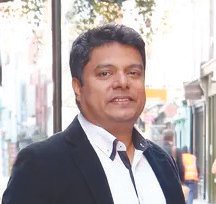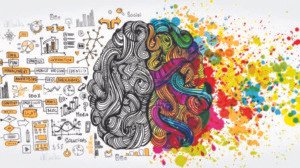
SAMIR MARDOLKER speaks on embracing the journey from material obsession to profound personal fulfillment
In the 2014 box office hit, Lucy (also on Netflix in Asia), Morgan Freeman plays the character of a professor researching cerebral development. He mentions that Dolphins use twice the proportion of cerebral capacity (20%) versus humans (10%). He says “This is because, unlike humans, Dolphins focus on ‘being’ and not ‘having’.” The movie does not provide any perspectives on how to focus on ‘being’ and do away with the pursuit of ‘having’ − that seems to have possessed mankind. I do not know if focus on ‘being’ will indeed result in increased use of cerebral capacity. However,
I found it incredibly interesting to pursue possibilities and discuss the future of life and flesh out ‘having’ versus ‘being’ a bit. In this 4-5 mins read, we start with how the charm of ‘having’ will fade away and then move to suggest actions to get us to the path of ‘being’. You may need to decrease the use of your cerebral capacity as you read this article to accept the divergence, myths and quirky perspectives until the content nudges you enough to start reflecting on the profoundness of Morgan Freeman’s statement on ‘having’ versus ‘being’.

Having is not in vogue for many categories:
The ‘having’ obsession is being challenged for the first time with the ‘sharing’ economy. The sharing economy is likely to quadruple in the next 4 years. Some categories are obvious and in our face every day e.g. ride hailing. Other categories operate in the background and come to limelight only when there is an issue e.g. many realised how much sharing was being done via ‘software as a service’ when we experienced the recent blue screen panic. It is predicted that basic services like water, housing, and electricity will soon be freely available and as we relinquish owning or having some of these categories just as ownership of say cars is likely to decline. Once done with the obsession of ‘having’, mankind may naturally shift focus on the ‘being’.
Ease of having is making ‘having’ less appealing:
Until about a generation ago, ‘having’ was largely an outcome of a struggle or out-of-the-world capability. For many, it took almost a lifetime to accumulate wealth and only a few could do it. This scarcity made ‘having’ more sought after. And it was more prestigious to be on the ‘have side’ of the have: have-not divide. But nowadays the number of millionaires is increasing at a very rapid pace. We have far more ‘rags to riches’ stories now than ever before thanks to several factors: the start-up economy, sophistication of financial markets, exponential growth in computing power and infrastructure that can seamlessly connect cerebral power across the globe. Perhaps ‘having’ has lost its charm to an extent?
Evolved forms of having are also being disrupted:
To maintain the scarcity associated with having, the ‘haves’ started accumulating knowledge and experiences. The evolved form of ‘having’ was about knowing/experiencing and less about owning. Consumption of experiential products like travel and other services increased exponentially making the accumulation of knowledge AND experiences the new avatar of having. But knowledge is now increasing democratised being harnessed by AI. And it will not be long before you can use the Metaverse to experience just about anything.
Having will indeed lose its charm. How do we proactively move to ‘being’? Feeling:
Build your awareness to feelings – your own feelings and of those around you. And from there on build the ability to develop intuition. Intuition that will help you develop and shape the future in ways that owning, knowledge and experience can’t. Practically speaking, start with using feelings to navigate tough choices where logic and rationale do not seem to work any better anyway. Learn from your mistakes and increase your confidence in your intuition.
Noticing: To enhance our feelings, we have to build our senses. Not just see, but observe. Not just hear, but listen. Training our senses to do more can come from discussing how others around us sense the same situations differently. We must learn to appreciate that our version of the world is shaped by our own baggage of the past. Getting other perspectives therefore helps us ‘notice’ things that we otherwise may have missed. Practically speaking, go get a coach and don’t be shy to speak to a therapist. And yes, travel. It was when humans moved that they learned the most. We moved in search of food and now we have to move to learn to notice. With movement/travel comes change of context and that will enhance noticing. And it will not come from watching travel shows on Netflix because real travel makes you a bit more uncomfortable given the foreign context versus your Netflix sofa seat. This discomfort evokes the primitive capabilities to notice better.
Actioning: Actioning will help you quickly conclude if what you have noticed works for you or not. A higher level of being is more likely when you do things differently. Practically speaking, if you are a salesperson, learn from a theatre artist how to captivate your audience. If you are a consultant, learn from a therapist how to listen, summarize and ask a reflective question to engage your stakeholders. If you are a large team manager, learn from the captain of a sport team on engagement, collaboration and team spirit. Doing things differently by learning from these adjacencies will help power a different outcome.
Playing: Finally, ‘Being’ may literally just be child’s play. Maybe children learn faster because they have fun in the process. Practically speaking, shedding inhibitions, mustering courage to try and enjoying the process will get us one more step closer to being.
Advantage Being:
In summary, we have to balance the pursuit of having with the practice of being. Practising ‘being’ will allow us to tap more into our cerebral capacity to build and create more than what we have in the last billion years of existence of life. As Morgan Freeman argues ‘the dolphin was not born with the world’s best echolocation system. It built it.’ The movie discusses bizarre capabilities we can embody once we focus on being and increase the use of our cerebrum. What exact proportion we use now is less in question and it is the possibilities we should consider to leap frog to a different level of human capability. A capability that again puts us as far more distinctly advanced than the machines…. else the machines are on our heels and arguably, will catch up!





